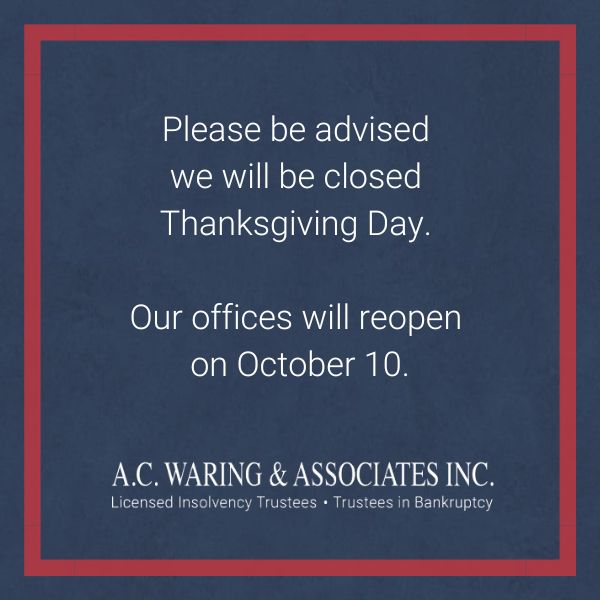
If there is something that 2020 has taught us, it’s the importance of having an emergency fund. Life is unpredictable, even at the best of times, and Covid 19 has taught us to have a financial Emergency fund if nothing else.
Emergencies aren’t exclusive to this year either; many of us, every single day, may have our cars breakdown, accidentally soak our computers, lose our jobs or our business. These events can put you back in a serious way. Thankfully, you may already have an emergency fund or can avail yourself of federal financial support, or other funds. Some of us will not have many resources left but, rather, have a backlog of debt. Federally Licensed Insolvency Trustees can assist you with your debt experience.
According to the Government of Canada, 64% of Canadians have the funds to support at least 3 months’ worth of expenses. What happens if you are in the remaining percentage, or your unemployment continues longer than expected or your debts continue to mount up? With no prior emergency fund savings, Trustees may be able to assist you to sort out your present situation.
What Did Emergency Funds Look Like Back in the Day?
The biggest difference between emergency funds 50 years ago compared to what they look like today is how inflation has affected money in general. Keeping a pile of money in a safe or in a mattress might be secure, but it will slowly depreciate in value as time goes on. On top of this, Canadians carry more debt than ever before (up to 150% when compared to disposable income, over double the debt of 1980’s).
So an effective emergency plan doesn’t just take into account your financial needs today, it will need to consider your financial needs for tomorrow as well. One of the best practices is to set up a special emergency account and deposit a little money into it every month. Never touch it. As it grows, you’ll have this rainy day fund to help you out.
Defining an “Emergency”
What is an emergency to you? Most people would consider losing their job, a car breakdown, or something along those lines as an emergency. Under normal circumstances, emergency savings are not funds set aside for college tuition, or a home purchase. It is money set aside, regularly to use in the event of a crisis. Without this plan, your college or home savings may revert into your ‘emergency funds’ unwittingly.
But what do you need to do to have an emergency fund you can depend on?
Building an Emergency Fund

Choosing an Emergency Fund Account
The first step towards having a healthy emergency fund is to open a savings account that’s right for you. The Government of Canada recommends finding an account that:
- Is separate from your day-to-day spending account
- Has low or no transactional fees
- Has penalty-free withdrawals
- Earns interest over time
Some of the best accounts you can choose to use can include a High-Interest Savings Account, which will accumulate interest on the money that is saved, or a Tax-Free Savings Account (TFSA), which will protect your money from being taxed over time.
Having an emergency fund may relieve you from acquiring more debt to pay for an expensive emergency.
Find Out How Much You Can Save
Everyone’s financial situation is different, so you will need to find a savings plan that works best for you and your lifestyle. A good plan is to start small; even saving as little as $5 a week can get you going towards some financial backup during an emergency.
Once you’ve determined what you can put away, start making a habit of it. Set a reminder on your phone, pick a day in the week, set dates in your calendar; finding out what works best for you will help you maintain good saving practices and grow a healthy emergency account.
How Much Should You Save?
The amount you should save depends on your financial situation and lifestyle, but in nearly every case, you should have about 3 to 8 months’ worth of savings toward monthly expenses put away in the event of an emergency.
This isn’t just money for rent and food, this is also money to help pay for utilities, or payments on your debts. But sometimes even an emergency backup is not enough so if you’re unable to pay your bills as a result of an emergency, or any situation, Trustees can help you find an option that works best for you and your financial matters.
Need Help With Debt?
A.C. Waring & Associates Inc. is committed to providing you with debt options that best support you and your family. Please, contact us today and find the debt solutions you deserve. We are the Debt Solutions People®.




